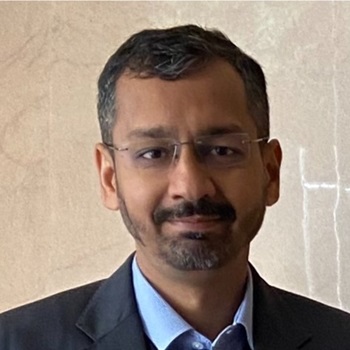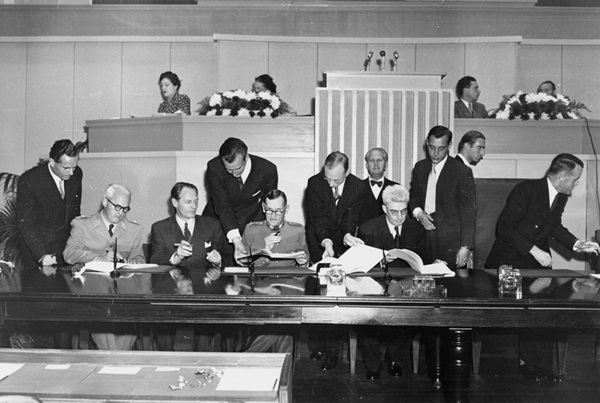.png)

Dr. Srinath Sridharan is a Corporate Advisor & Independent Director on Corporate Boards. He is the author of ‘Family and Dhanda’.
May 15, 2025 at 5:52 AM IST
It began as a hopeful experiment in the aftermath of unimaginable destruction. Out of the rubble of the Second World War rose a new architecture for global cooperation, a mosaic of institutions and treaties designed to prevent another catastrophe. The rules-based world order was born from ashes, ambition and an urgent desire for peace. It was not just about international law. It was a moral argument, a vision that power could be restrained by consensus and might could be softened by norms.
Geneva, with its lakeside diplomacy and hushed corridors, became the symbolic heart of this experiment. Over time, the city amassed over thirty-five multilateral organisations. Their acronyms came to represent everything from health to trade to human rights. Together, they were meant to safeguard a delicate equilibrium. Rich and poor nations alike, it was believed, would be heard. Conflict would give way to conversation. Interests would be balanced by obligations.
That was the theory. Reality has since caught up with inconvenient force.
The post-Cold War moment of unipolar dominance masked deep fractures. The invasion of Iraq, the bypassing of global consensus, and the re-emergence of transactional politics began to shake the faith. More recently, the pandemic exposed the hollowness of many global assurances. Vaccines were hoarded. National interests prevailed over shared suffering. Climate summits turned into performance theatre. Trade rules bent to the will of the dominant few. The war in Ukraine, and now the agonising silence over Gaza, has laid bare a painful truth.
Today, we must ask, with clarity and courage: whom does this rules-based architecture really serve? Is it a universal framework or a curated convenience for the powerful? When rules are bent without consequence, when breaches are met with selective outrage, do the rules still rule?
Geneva still stands. Its institutions still function. But does anyone truly care? Walk the halls of the WTO or the WHO and one senses a growing fatigue. Meetings are held, reports released, declarations signed. Yet outside those walls, credibility leaks. In the capitals of the Global South, these institutions no longer inspire reverence. They evoke resignation.
And yet, it would be misguided to throw the baby out with the bathwater. Many of these Geneva-based institutions have, in fact, delivered consistently and quietly on areas of profound importance. The world’s telecom protocols — the very standards that let us connect across continents — are agreed and maintained through such frameworks. Satellites in orbit are tracked and coordinated through global protocols. The distribution of radio spectrum, the allocation of orbital slots, the scaffolding of nuclear non-proliferation — all owe their existence to painstaking multilateralism.
Beyond the well-known institutions like the WTO and WHO, Geneva hosts several lesser-known but pivotal multilateral bodies. The World Intellectual Property Organization governs international patent laws and innovation. The Bureau International des Poids et Mesures standardises global measurements. The International Organization for Standardization sets technical standards across industries.
These institutions may not make headlines, but they quietly sustain the global order, highlighting the often-overlooked value of multilateralism. They are foundational to a functioning, interconnected world. So, while criticism of the system’s failures is warranted, so too is recognition of its enduring successes. The challenge, then, is not rejection but repair.
There is another layer of complexity. As the cost of conflict lowers — through asymmetric warfare, cyber disruption, non-state actors and algorithmic intervention — the likelihood of disputes increases. The traditional deterrents no longer deter as they once did.
Against this backdrop, the architecture of rules has not kept pace with the shifting nature of power, pressure and expectation. The strains on national sovereignty, on economic equity, on environmental sustainability are not just intensifying. They are mutating.
Rules, standards, norms and treaties must be alive to these shifts. They require constant upgrading and recalibration. When the gap between global governance and ground reality becomes too wide, then reform becomes not just necessary but existential. Institutions that do not evolve are not merely outdated. They become irrelevant.
Reform, we are told, is the answer. The reality is more cynical. Every attempt at structural change is met with the smirk of power. Quotas in the IMF, vetoes at the UN Security Council, voting rights in multilateral banks — all reveal a stubborn hierarchy.
Influence, not equity, continues to decide the pecking order. The architecture groans under the weight of its own irrelevance.
The West and developed nations have a vested interest in maintaining the status quo of multilateral institutions. For them, the existing system offers stability and influence, however flawed. In contrast, nations like India, long on the margins of global decision-making, are calling for a revisionist approach — a recalibration that reflects the shifting power dynamics of the 21st century. India’s frustrations are palpable, as the speed, nature, and scale of necessary reforms seem frustratingly slow, almost cynically so.
Meanwhile, China, which for years resisted the notion of altering global governance, has now pivoted to a more assertive role. It seeks a louder voice, especially in areas directly tied to its vision of the world, such as trade, technology, and climate policy. The question becomes: in a world that is rapidly changing, why should the governance structures that were built for another era remain fixed?
So, what then is the alternative? The answer does not lie in tearing it all down. The world cannot afford anarchy masquerading as sovereignty. But nor can it survive on nostalgia and half-measures. A reimagining is needed. Not just reform, but reinvention.
New global platforms must be agile, equitable and technologically attuned. Legitimacy will no longer be conferred by historical privilege but by inclusivity and performance. Decision-making must move from drawing rooms in Geneva to the digital commons where the future is being shaped. Climate justice, data governance, trade equity and peace-building must reflect the complexities of the twenty-first century, not the power plays of the twentieth.
The question before us is no longer whether the old order will hold. It is how quickly we can build something better before it collapses entirely. Diplomacy must be democratic. Multilateralism must be meaningful. And above all, rules must apply to all, not just the ruled. Geneva may still matter. But only if it rediscovers the spirit of why it mattered in the first place.




